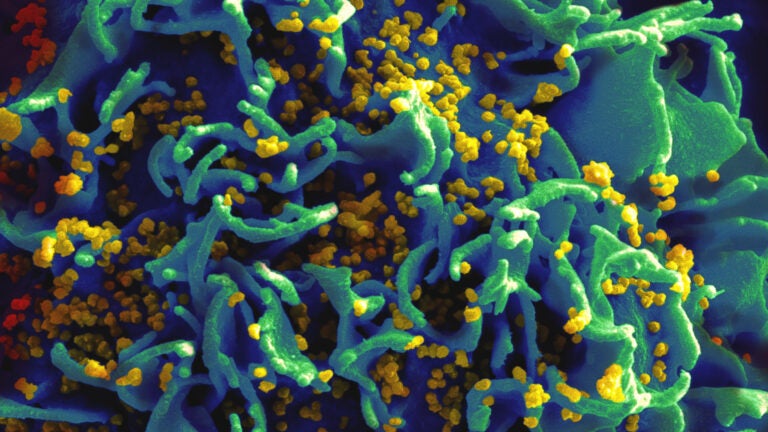
Scanning electron micrograph of HIV particles infecting a human T cell (Photo/National Institute of Allergy and Infectious Diseases)
USC Stem Cell researchers share a vision of the future
Faculty discuss recent progress made in the field of stem cell biology as a whole
What do former British Prime Minister Tony Blair and singer Will.i.am have in common? They both attended this year’s Milken Institute Global Conference, where USC Stem Cell researchers offered a glimpse into the future of regenerative medicine.
Held from April 27 to April 30 in Beverly Hills, the conference brought together leaders in the fields of science, health, government, finance, entertainment and philanthropy from more than 50 nations. A nonprofit, nonpartisan think tank, the Milken Institute aims to solve urgent social and economic challenges and improve lives by creating jobs, widening access to capital and enhancing health.
During a well-attended panel session about regenerative medicine, Paula Cannon, associate professor at the Keck School of Medicine and principal investigator with USC Stem Cell, talked about genetically modifying hematopoietic or blood-forming stem cells to cure HIV/AIDS.
[Stem cell biology] is going to provide amazing and different ways to treat diseases.
Paula Cannon
“To me, thinking about curing HIV in people is aspirational at this point, but this is a very important goal,” she said. “And there are some glimmers of hope.”
Her innovative approach is inspired by the “Berlin patient,” a man cured of both HIV and leukemia through a bone marrow transplant from a donor with a mutation in a gene called CCR5 that confers natural immunity to HIV. The first human clinical trials will take place late this year in collaboration with the City of Hope and Sangamo BioSciences.
‘We’ve been doing really good science’
She also emphasized the recent progress made in the field of stem cell biology as a whole.
“In 10 years, we’ve been doing really good science,” she said. “We’ve laid the groundwork not just for this state, but for the rest of the world. This is going to provide amazing and different ways to treat diseases.”
One such way might be through fasting, according to preliminary data from Valter Longo, professor of gerontology and principal investigator with USC Stem Cell. He shared evidence that fasting “turns on” hematopoietic stem cells, which can regenerate the immune system and possibly protect against cancers. Fasting also appears to encourage neural stem cells to regenerate, protecting against the progression of Alzheimer’s disease.
“We think — and we have a lot of evidence for this — that you need to push the body into being in a ketogenesis mode [during which fats are broken down to produce energy-storing molecules called “ketone bodies”], and this happens after about two days of fasting,” said Longo, Edna M. Jones Professor of Biogerontology at the USC Davis School of Gerontology. Longo has a joint appointment at the USC Dornsife College of Letters, Arts and Sciences. “So that’s what you need to reach to have this reprogramming,” which appears to activate stem cells.
Fellow USC Stem Cell principal investigator and USC Davis Dean Pinchas Cohen discussed how new tools to predict life expectancy can help people make the most of their remaining years.
“How we plan our retirements, how we plan our health care can now be customized, individualized and personalized to a much greater degree using combinations of genomic technologies and informatics,” he said. “And that allows us to maximize the individual benefit for each person.”
Other USC faculty members who presented at the conference included former Los Angeles Mayor Antonio Villaraigosa, professor of the practice of policy at the USC Price School of Public Policy, and Bloomberg Television correspondent Willow Bay, incoming director of the USC School of Journalism at the USC Annenberg School for Communication and Journalism.
Blair called the conference an opportunity to “get an extraordinary sense of what is possible, not just in the intellectual sphere, but in the practical sphere of how you make the world a different and better place.”
